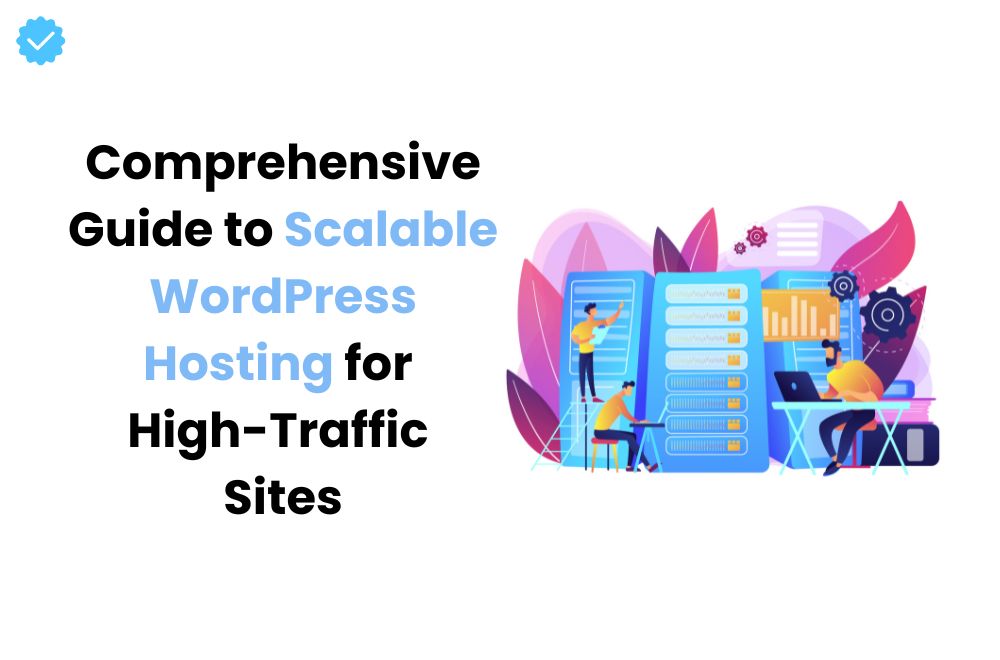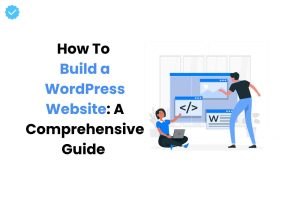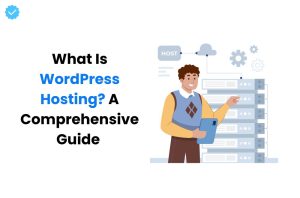If you are an online business owner, scaling your website is of the utmost importance. This is especially true when there is a sudden surge of traffic, which may slow down or make the website unavailable. This may make your website unappealing to potential customers and drive them away.
Additionally, it also tends to increase the bounce rate and harms the website’s reputation. Thankfully, there are some strategies that can help maintain larger traffic volumes and keep scaling WordPress for high-traffic events.
With this article, you will learn how to do scalable WordPress hosting, key features of scalable WordPress hosting & much more. So, let’s begin.
Why Does WordPress Website Crash Due to High Traffic?
Just imagine having a store fully opened, ready to welcome customers, and suddenly having your store shut down. One can experience the same situation with a high-traffic website.
Many e-commerce owners dream of having a website with an all-time high online traffic because, let’s be honest, more traffic will lead to more customers, which will directly lead to more sales. But is too much traffic a good thing?
To keep the answer simple, the answer is no. Too much traffic can slow down websites and further escalate them to a position where your website may crash.
Now comes the next question: Why do websites with good traffic crash? Isn’t having traffic all that owners want? But in reality, it is all different. A busy website crashes due to a mismatch between traffic levels and the infrastructure.
When visitors check out your website, they start adding products to their carts, searching for accessories, and inputting passwords, which exceeds the website’s overall capacity. All of this chaos and ruckus further leads to websites freezing, slowing, and crashing.
But, there are a few situations other situations as well apart from the increased traffic that can lead to the crashing of WordPress website:
- Slow loading times
- Growing amount of global audience
- Addition of more features and functionalities
- Frequent downtimes and crashes
Reasons For Sudden High Traffic
No one scenario can be blamed for the sudden spike in website traffic. To handle the situation better, one needs to understand the primary cause of the issue better and then find a solution. Here are some of the common scenarios that may be the cause of the increase in traffic:
Ad Campaigns
Investing in ad campaigns is one of the most direct ways to drive traffic to your WordPress site. Platforms like Google Ads, Facebook Ads, and Instagram Ads allow you to target definite demographics, ensuring your content reaches a broader audience. When an ad campaign is well-executed, it can lead to a significant influx of visitors. This can be due to appealing visuals, compelling copy, and strategic placement that draws users’ attention.
Contest
Contests and giveaways are a highly effective strategy for boosting traffic. The opportunity to win creates a sense of excitement and engagement that can draw many participants to your site. Promoting the contest on social media and other channels can further increase visibility. Encouraging contestants to tell their networks about the competition can have a viral effect and increase traffic.
Seasonal Events
Seasonal events and holidays present a unique opportunity to capture the attention of a broader audience. Whether it’s Christmas, Black Friday, Valentine’s Day, or a significant event in your industry, tailoring your content and promotions to these occasions can attract more visitors. For example, offering holiday-themed content, special discounts, or exclusive products can entice users to visit your site.
Viral Content
Creating viral content is the main aim of digital marketing. When a blog post, video, infographic, or other type of content resonates with a large audience, it can spread rapidly across the internet, driving massive traffic to your site. Viral content often taps into trends, emotional triggers, or unique, shareable insights.
eLearning Website
The rise of eLearning has led to an increased demand for online courses and educational content. If your WordPress website offers eLearning resources, launching a new course, webinar, or educational material can attract many visitors. The ongoing remote learning and professional development trend also means a steady audience is looking for valuable educational content. Promoting your eLearning offerings through partnerships, social media, and email marketing can further drive traffic.
Is WordPress Scalable?

With the above content, it is pretty much clear that high traffic is not always a good thing. So, how to handle such scenarios from impacting your website? The answer is WordPress scalability. Before understanding whether or not you can scale your WordPress site, let’s first understand the whole concept of scalability. What does scaling actually mean?
What is scaling?
Scaling is a process that increases the capacity of one’s website to handle traffic and users without impacting the site’s performance. Now, jumping to the question whether or not WordPress is scalable, the answer is YES it is.
WordPress is most positively scalable, and whenever your WordPress website experiences a sudden spike here are the two ways to handle it swiftly:
- Vertical Scaling: It involves increasing the resources of the existing server.
- Horizontal Scaling: It involves adding more servers to the overall infrastructure
Which ever scalable WordPress hosting way you choose amongst the ones stated above will help get the desired results.
How Can One Scale Their WordPress Website?
Scaling a WordPress website for high traffic effectively involves optimizing its performance, security, and content management. Here’s a comprehensive guide to scaling your WordPress site:
Optimize Site Speed

Site speed is vital for both user experience and SEO. Select a reputable hosting provider offering fast servers and WordPress-specific resources. Optimize your database by deleting superfluous data and utilizing plugins such as WP-Optimize. Reduce the number of heavy plugins and themes, and keep your WordPress core, themes, and plugins up to date. Use tools like Google Page Speed Insights to identify and fix performance issues.
Follow All Security Practices
Maintaining robust security is essential for scaling. Use strong, unique passwords and change them regularly. Implement two-factor authentication (2FA) for an additional layer of security. To repair vulnerabilities, regularly update WordPress, themes, and plugins. Install security plugins like Wordfence or Sucuri to monitor and protect your website from harmful activity. Regular backups are critical; use plugins like UpdraftPlus to schedule automatic backups.
Optimize Images
Large images can slow down your site. Use image optimization tools like Smush or ShortPixel to compress images without sacrificing quality. Implement responsive images to ensure the appropriate image size is served based on the device. Use the WebP format for better compression and faster loading times than JPEG and PNG.
Repair Broken Links

To create a scalable WordPress site broken links are another aspect to be taken care of. They can harm user experience and SEO. Use tools like Broken Link Checker to identify and fix broken links on your site. Regularly audit your site to ensure all links lead to active pages. Fixing broken links can also help reclaim lost link equity, improving overall site performance.
Make Use of Caching Plugins
Caching significantly boosts site speed by storing static versions of your site. Plugins like W3 Total Cache, WP Super Cache, or WP Rocket can dramatically reduce load times. These plugins offer features like page caching, database caching, and object caching, which help deliver content faster to users by minimizing the load on your server.
Managed WordPress Hosting
Investing in managed WordPress hosting simplifies scaling your site. Providers offer optimized server environments, automatic updates, advanced security measures, and expert support. This ensures faster load times, enhanced security, and reliable backups. With features like staging environments, you can test changes safely.
Managed hosting lets you concentrate on growing your site while professionals handle the technical aspects, keeping your site fast, secure, and scalable. This hassle-free approach provides a solid foundation for your online presence, ensuring optimal performance and peace of mind.
Optimize Tracking and Reporting Site Performance
Monitoring your site’s performance is vital for scaling. Tools like Google Search Console or Google Analytics track user behavior, traffic sources, and site performance. Review these metrics regularly to identify areas for improvement. Additionally, plugins like MonsterInsights can integrate Google Analytics directly into your WordPress dashboard, making monitoring performance in real time easier.
Key Features of Scalable WordPress Hosting
A scalable WordPress comes with plenty of key features. Here are some of the essential aspects to consider:
Flexible Resources
A key feature of scalable WordPress hosting is its flexible resource allocation. This ensures your website can efficiently handle varying traffic levels without compromising speed or performance. With the convenience of auto-scaling capabilities, your site can seamlessly adapt to increased demand during peak times or special promotions. Managed WordPress hosting providers often include these capabilities, which automatically adjust resources based on your site’s needs, ensuring optimal performance at all times and giving you peace of mind.
Content Delivery Network (CDN)

A Content Delivery Network (CDN) plays a crucial role in scalable WordPress hosting by significantly enhancing website load times and overall performance. A content delivery network (CDN) delivers static content from your site, such as photos, CSS, and JavaScript files, across a global network of computers. When people visit your website, the CDN delivers content from the server closer to their location, reducing latency and speeding up load times.
Load Balancing
Load balancing is vital for maintaining the stability and availability of your WordPress site, especially for high-traffic websites. It ensures that incoming traffic is evenly distributed across multiple servers, prohibiting any single server from becoming overwhelmed. This is particularly important during traffic spikes.
Distributing the load also allows for better resource utilization, ensuring your site remains responsive and performs well under varying traffic conditions, giving you confidence in your site’s stability and performance.
Redundancy
Redundancy in scalable WordPress hosting adds an extra layer of reliability and security. It involves storing multiple instances of your site and its data across different locations. If one server fails, another can immediately take over, ensuring uninterrupted access to your site.
This failover mechanism is essential for maintaining high availability and minimizing downtime. Managed WordPress hosting providers typically offer automated backup solutions, ensuring your site can recover swiftly from potential data loss or corruption.
Conclusion
WordPress is considered to be one of the most popular CMS platforms that can handle high traffic and scale up to meet ongoing demands. However, for scaling WordPress for high traffic, reliable knowledge and skills are required to avoid crashes and make the whole process seamless.
Never assume that if you are hosting your website in a cloud environment, it can handle anything you give it. Test, adjust, and then make your website live. For a more personalized and safer approach to scaling your website, consider using a managed WordPress hosting service.
If you are looking for a dependable managed WordPress hosting provider, contact WP Provider and promptly receive a fully automated solution tailored to your needs.




